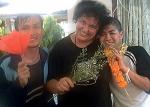Third Culture Kids
Third Culture Kids are children of expatriate families who live for a significant proportion of their lives in a culture other than their own, where they travel to many countries other than their own passport country. This results in the adaptation and incorporation of certain characteristics from a variety of cultures into their own personalities.
These kids were first studied in significant numbers by sociologists in the 1960’s and the initial subjects were drawn from American children of missionary, diplomatic or military families. Other terms that have been used are Global Nomads, army brats, transnationals, transculturals, and internationally mobile children.
Researchers discovered that overwhelmingly and across the globe TCKs merge their birth culture with the culture of the host countries they’ve lived in to create a third, very distinct culture of their own. What was surprising was that there were also a distinct set of personality traits exhibited that were not dependant on the countries in which they grew up or their family background. In other words, an Australian missionary kid who grew up in the Philippines, Zambia and Brazil, would share a distinct set of personality trais in common with a Swiss diplomat’s child who had lived in Japan, America, Fiji and Spain. These trais were defined as being ‘third culture” thus giving birth to the term “Third Culture Kids.”
The major problem that TCKs face as they grow up is to define where they truly belong. They are products of the sum of their experiences, rather than a product of the native soil of their passport country. Their multicultural upbringing encourages a stronger worldview and well-developed cross-cultural skills. These kids are able to get along with people of many different races. Having a less clearly defined sense of belonging to one definite “us” means they are less comfortable with dealing with a foreign “them.” They are able to view events from a wider perspective, more used to adapting to the view points of the people and cultures where they have lived as well as to the views of the people of their passport country. Some TCKs, however, experience rootlessness and a constant, unresolved grief due to the loss of contact or breaking off of relationships. Life becomes even more difficult for them when they go back to live in their own country where defining social signifiers like fashion trends and music have changed.
Even those of us in the West who travel to many different countries over a long period of time as adults, however, often find ourselves developing a “Third Culture” personality, more elegantly described by Pico Iyer in his book “The Global Soul.”
For more information you can visit www.tckworld.com.
Tags: Bangkok, Culture, Expats, Thai Culture, Thailand


“Very Interesting”